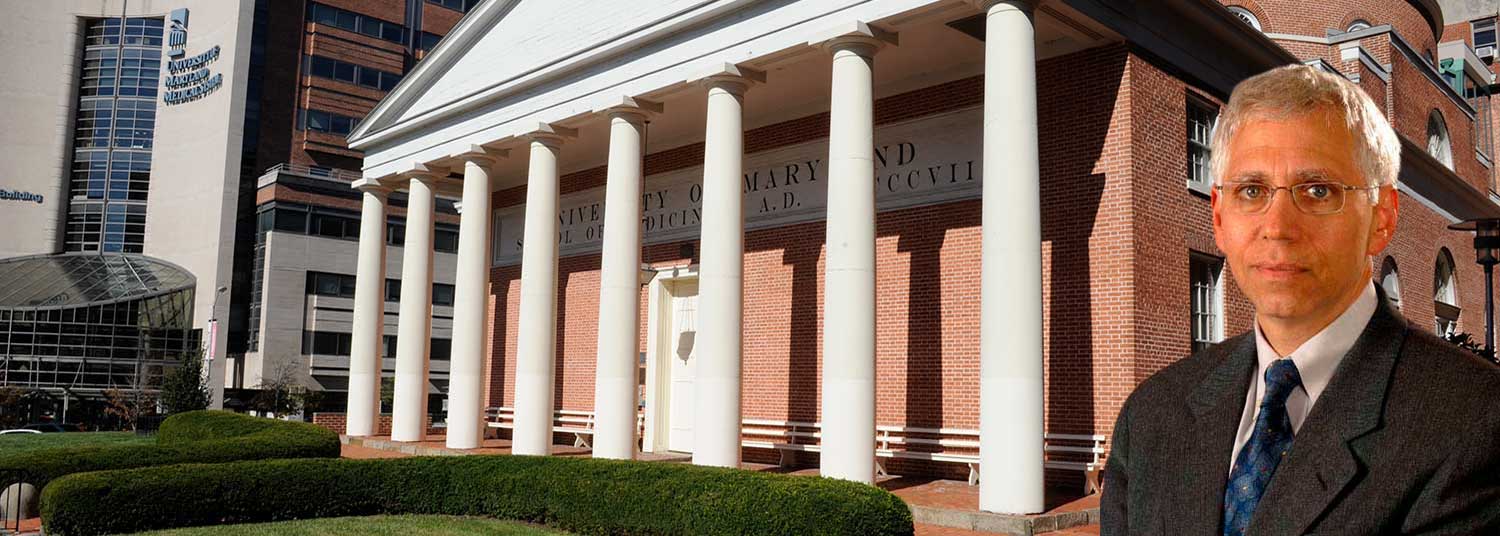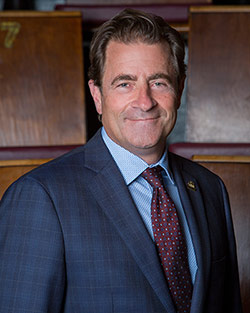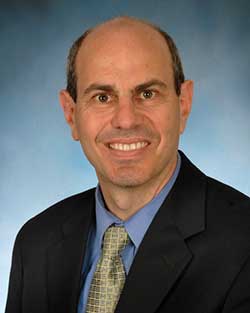August 12, 2024

Led Department Ranked Among Top 10 in the Nation During His 17-Year Tenure
University of Maryland School of Medicine (UMSOM) Dean, Mark T. Gladwin, MD, announced today that Jay Magaziner, PhD, MSHyg, has decided to step down at the end of the year from his role as Chair of the Department of Epidemiology & Public Health after 17 years of dynamic leadership and academic achievement. Depending on the timing of the nationwide search for his replacement, an interim or permanent leader will be appointed to chair the department, effective in January, 2025.
During his tenure, the Department of Epidemiology & Public Health has consistently ranked among the top departments of its kind at public medical schools and within the top 10 across all medical schools over the past 15 years. Dr. Magaziner made it his mission to expand the department’s involvement with other major programs in the School of Medicine and UMB.
Dr. Magaziner is not retiring. In his transition, he will continue to pursue his research and academic collaborations, as well as mentoring the next generation of scientists.
 “I am exceedingly grateful for Dr. Magaziner’s steady leadership, and he leaves the department in a strong position as a nationally recognized entity for research, education and training in all areas pertaining to epidemiology and public health,” said Dean Gladwin who is the John Z. and Akiko K. Bowers Distinguished Professor and Dean, UMSOM, and Vice President for Medical Affairs, University of Maryland, Baltimore. “While Dr. Magaziner will be stepping down from the role of chair, we are fortunate to retain his dedication on an impressive array of research projects, along with his invaluable organizational knowledge and mentorship as a senior faculty member.”
“I am exceedingly grateful for Dr. Magaziner’s steady leadership, and he leaves the department in a strong position as a nationally recognized entity for research, education and training in all areas pertaining to epidemiology and public health,” said Dean Gladwin who is the John Z. and Akiko K. Bowers Distinguished Professor and Dean, UMSOM, and Vice President for Medical Affairs, University of Maryland, Baltimore. “While Dr. Magaziner will be stepping down from the role of chair, we are fortunate to retain his dedication on an impressive array of research projects, along with his invaluable organizational knowledge and mentorship as a senior faculty member.”
Under Dr. Magaziner’s leadership, the department solidified its structure with seven divisions, incorporating Global Health Sciences, Cancer Epidemiology, Translational Toxicology, and Preventive Medicine with the three existing divisions (Gerontology, Biostatistics and Bioinformatics, Health Care Outcomes). He was also instrumental in updating the department’s name and identity to the Department of Epidemiology and Public Health (formerly Preventive Medicine) and renaming the Division of Genomic Epidemiology and Clinical Outcomes (formerly Health Care Outcomes).
When he was appointed Chair in 2007, he set a goal of increasing integration with other SOM and UMB programs. To this end, he has guided the department towards an integrated approach to conducting collaborative research with numerous programs, centers, and institutes providing expertise in epidemiology, biostatistics, survey research design and execution, and population science.
Departmental collaborations have resulted in leadership roles within the Greenbaum Comprehensive Cancer Center, Institute for Clinical and Translational Research, Maryland Psychiatric Research Center, Institute for Human Virology, Institute for Genomic Sciences, Center for Research on Aging, and Institute for Health Computing, and innumerable collaborations with faculty throughout the university.
 “Jay is a brilliant researcher and great leader,” said Anthony Harris, MD, MPH, Director of the Division of Genomic Epidemiology and Clinical Outcomes and Professor of Epidemiology and Public Health. “He always navigated new developments and transitions in the department with the highest level of empathy, great listening skills and a high moral compass.”
“Jay is a brilliant researcher and great leader,” said Anthony Harris, MD, MPH, Director of the Division of Genomic Epidemiology and Clinical Outcomes and Professor of Epidemiology and Public Health. “He always navigated new developments and transitions in the department with the highest level of empathy, great listening skills and a high moral compass.”
He has been a champion of interdisciplinary education and supported growth of a professional training program in public health with an accredited MPH Program that has dual degree programs with all professional schools at UMB, a two-campus Doctoral Program in Gerontology, and the MS in Clinical Research with a robust summer course for those interested in clinical research fundamentals.
The department also played a pivotal role in establishing the campus-wide Program in Health Equity and Population Health and the Center for Innovation in Diagnosis, has housed the Center for Research on Aging, and University of Maryland Claude D. Pepper Older Americans Independence Center, and served as the academic home for members of the VA’s Cooperative Studies Center.
In addition to his role as Chair, Dr. Magaziner was a co-founder of the University of Maryland Center for Research on Aging, dedicated to advancing interdisciplinary aging research across the University of Maryland, and established the Baltimore Hip Studies, a program designed to evaluate outcomes and develop interventions to improve outcomes after hip fracture.
A distinguished researcher, he has been continuously funded by the National Institute on Aging since 1983 for studies on dementia in nursing homes and hip fracture outcomes. He served as Principal Investigator for multiple NIH grants, including two consecutive NIH MERIT Awards recognizing his contributions to understanding hip fracture outcomes, and the UM Pepper Center, focused on unique enablement themes and involving faculty from multiple UM schools and departments.
 “Jay's pioneering research has provided valuable insights into the functional outcomes and recovery trajectories of hip fracture patients, the effects on caregivers and the healthcare system,” said Mary-Claire Roghmann, MD, MS, Associate Dean for Physician-Scientist Training and Professor of Epidemiology and Public Health. “His findings have informed current clinical practices, future research, and healthcare policy, emphasizing that hip fracture is not necessarily the end but a condition from which many can recover.”
“Jay's pioneering research has provided valuable insights into the functional outcomes and recovery trajectories of hip fracture patients, the effects on caregivers and the healthcare system,” said Mary-Claire Roghmann, MD, MS, Associate Dean for Physician-Scientist Training and Professor of Epidemiology and Public Health. “His findings have informed current clinical practices, future research, and healthcare policy, emphasizing that hip fracture is not necessarily the end but a condition from which many can recover.”
Beyond his research contributions, Dr. Magaziner has served on the governing council of the Gerontological Society of America, President of the Fragility Fracture Global Network, and Deputy Editor of the Journal of Gerontology: Medical Sciences. In 2020, he was named the Founders Week Researcher of the Year by the University of Maryland Baltimore, recognizing his extraordinary work and outstanding accomplishments.
 “It has been a great honor to serve UMSOM and the Department of Epidemiology and Public Health,” said Dr. Magaziner. “It is because of our incredibly talented faculty, staff, students, and administration that we have been so successful for so long. Chairing the department and working with such wonderful and dedicated people has been a high point in my career. As I move into the next phase of my academic career, I am excited to broaden my commitment to excellence in research and education, and support the continued growth of the department and school.”
“It has been a great honor to serve UMSOM and the Department of Epidemiology and Public Health,” said Dr. Magaziner. “It is because of our incredibly talented faculty, staff, students, and administration that we have been so successful for so long. Chairing the department and working with such wonderful and dedicated people has been a high point in my career. As I move into the next phase of my academic career, I am excited to broaden my commitment to excellence in research and education, and support the continued growth of the department and school.”
Dr. Magaziner has been faculty at UMSOM since 1982 and received his MSHyg from the University of Pittsburgh. He also earned his PhD and MA from the University of Chicago.
About the University of Maryland School of Medicine
Now in its third century, the University of Maryland School of Medicine was chartered in 1807 as the first public medical school in the United States. It continues today as one of the fastest growing, top-tier biomedical research enterprises in the world -- with 46 academic departments, centers, institutes, and programs, and a faculty of more than 3,000 physicians, scientists, and allied health professionals, including members of the National Academy of Medicine and the National Academy of Sciences, and a distinguished two-time winner of the Albert E. Lasker Award in Medical Research. With an operating budget of more than $1.2 billion, the School of Medicine works closely in partnership with the University of Maryland Medical Center and Medical System to provide research-intensive, academic, and clinically based care for nearly 2 million patients each year. The School of Medicine has more than $500 million in extramural funding, with most of its academic departments highly ranked among all medical schools in the nation in research funding. As one of the seven professional schools that make up the University of Maryland, Baltimore campus, the School of Medicine has a total population of nearly 9,000 faculty and staff, including 2,500 students, trainees, residents, and fellows. The School of Medicine, which ranks as the 8th highest among public medical schools in research productivity (according to the Association of American Medical Colleges profile) is an innovator in translational medicine, with 606 active patents and 52 start-up companies. In the latest U.S. News & World Report ranking of the Best Medical Schools, published in 2023, the UM School of Medicine is ranked #10 among the 92 public medical schools in the U.S., and in the top 16 percent (#32) of all 192 public and private U.S. medical schools. The School of Medicine works locally, nationally, and globally, with research and treatment facilities in 36 countries around the world. Visit: medschool.umaryland.edu
Contact
Office of Public Affairs
655 West Baltimore Street
Bressler Research Building 14-002
Baltimore, Maryland 21201-1559
Contact Media Relations
(410) 706-5260
